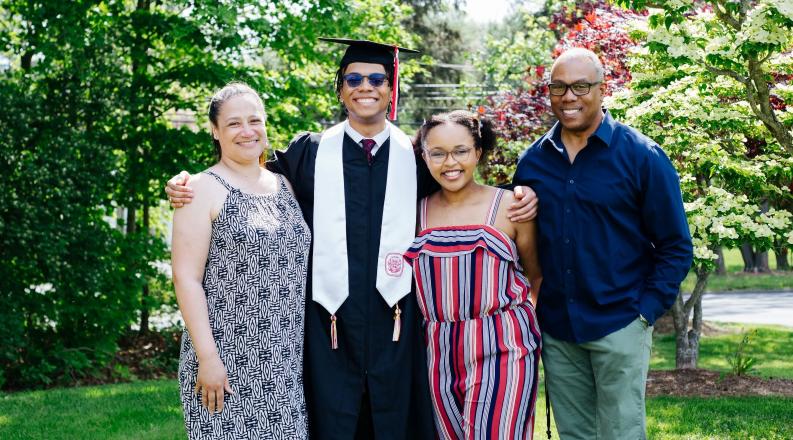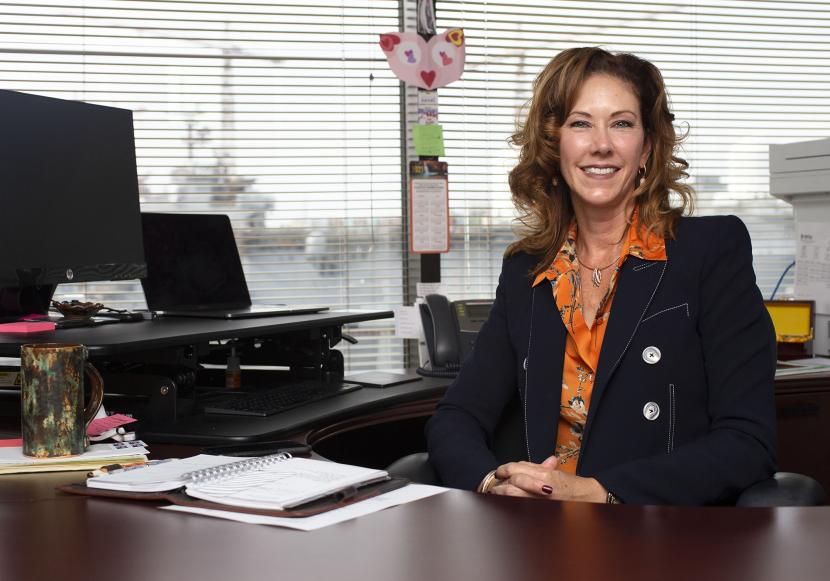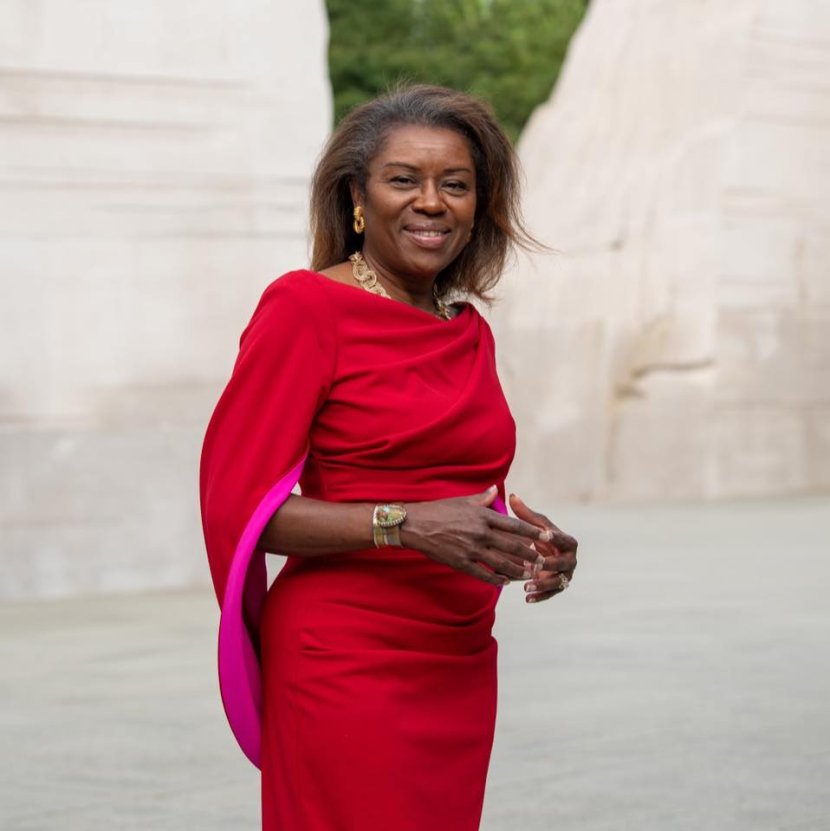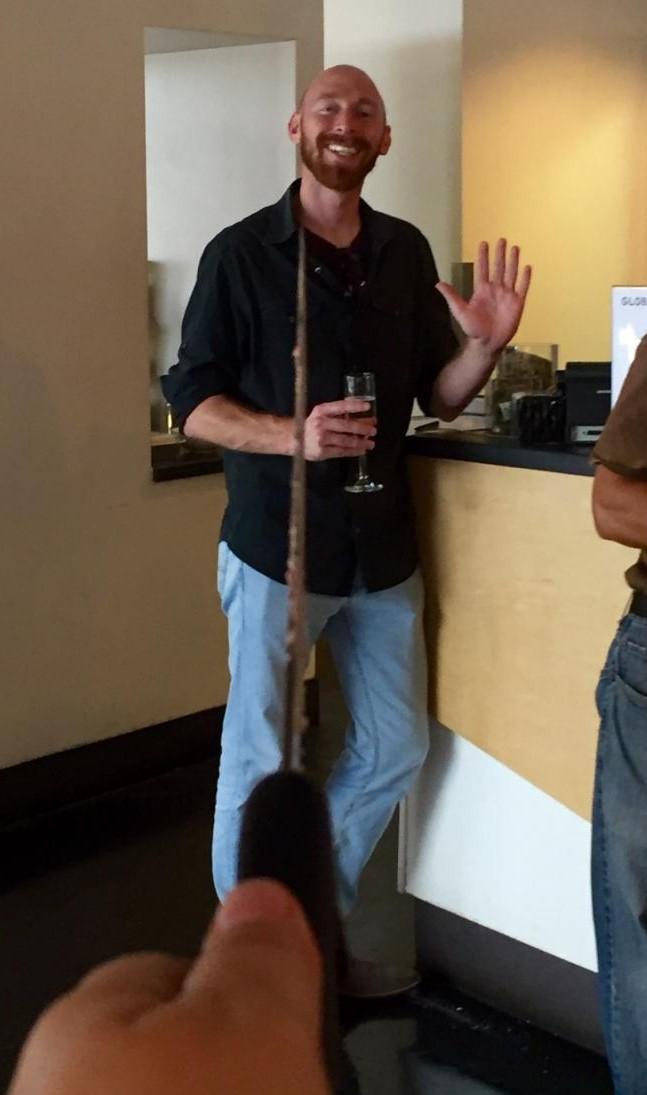By Harry Minium
Jay Harris first saw Stephanie Prigmore was during a Labor Day fraternity dance at the Webb Student Center. She walked in on the arm of one of his good friends. Even from across the room, she took his breath away.
He walked over and asked her to dance. She smiled and agreed, then whispered, "You're cute." He asked her to say it again, but all she did was smile and shake her head.
It was the beginning of a love story, though it took a while to play out. She was an Old Dominion University student, a recent transfer from Virginia Union and had a boyfriend. He was an ODU graduate living in Washington, D.C., and was just getting over a tough breakup.
It was a few more months before they began dating. But when they did, they knew it was for life. They were married a few years later.
Harris can't say how many times he's thanked God that he was at that dance and looked up when she walked in.
Without her, he would not have his job at ESPN, where he is a SportsCenter anchor whose name, face and voice has been seen by millions. He's been there 18 years, a lifetime in the world of sports broadcasting.
After Harris was twice turned down job offers from ESPN, Stephanie wrote down the plusses and minuses of leaving a Pittsburgh TV station and moving to Bristol, Connecticut, to try something he'd never done before - sportscasting.
"She looked at me with that look that men get when they're about to mess up, but they don't know it, but their wife or significant other does," he said. "Once she put it all down on paper, it was a no-brainer."
Nor without her would he have two beautiful, successful children. Stephanie, a Green Run High graduate, gave up her job as a bank manager, in part because her husband worked crazy hours, to become a full-time mom when their son, Bryce was born.
She nearly died in childbirth, and that brought them even closer. They later adopted a little girl they named Tyra.
"Family, it means everything to Jay," said Nancy Lieberman, a former ODU All-American women's basketball player. "He adores his wife and children. They've been through a lot together."
He also cares for what he calls his second family - the ODU community. Harris is a member of ODU's Board of Visitors, has spoken at ODU graduations and other events and will do just about anything to help his alma mater.
Harris was born in Norfolk and lived for several years in Portsmouth. After his parents divorced when he was a child, he moved to Chapel Hill, North Carolina, with his mother, Ola Harris, and was raised in the shadows of the University of North Carolina.
He was a good student in high school and had his pick of schools but chose ODU in part to be closer to his father, Al, a longshoreman who spent much of his life in the Park Place neighborhood just south of the University.
Al was a philanthropist, albeit of the blue-collar variety. Beyond being a longshoreman, he was a handyman who helped neighbors repair houses. He helped friends and sons and daughters of friends get jobs. He would slip some money to those who were down and out. Jay said he helped hundreds of people.
When Lieberman and Harris gathered in Newport News this summer to dedicate a "Dream Court" at the Newport News YMCA, it was named for Jay.
However, Harris made it clear to everyone there that he wanted people to remember his father.
"My name's on the court," he said. "But my father's spirit is there."
Harris worked at ODU for the campus information center, with the student government and joined Alpha Phi Alpha fraternity. "I was a sports fan," he said. "But I didn't go to a whole lot of games."
He graduated in 1987 with a degree in speech communications with an emphasis in mass media. But instead of using his degree to get a job, he moved back to Chapel Hill and attempted to make a career in music with high school buddies in a band called After Six.
"I had a job, we practiced and we wrote some original stuff," he said. "But as with most things like that, it didn't work out."
Eventually, he decided to pursue a career as a broadcast news reporter.
He called Don Roberts, now a news anchor at WAVY and then a manager at radio station WRAP in Norfolk. I'll hire you, but I can't pay you, Roberts said.
Harris came to Hampton Roads anyway, and Roberts eventually found some money to pay him.
He did several stories on the Greekfest riots in Virginia Beach for the Sheridan Broadcasting Network, the largest black-owned network in the country at that time.
"That got my foot in the door," he said.
He moved to Pittsburgh, where he worked for a Sheridan radio station before applying at WPXI-TV, a 24-hour news station, to become a news update anchor. After a few years, he called WPGH-TV, and asked for an on-air reporting job.
"They said I didn't have enough TV experience," he said. "But I had been in the market for six years. I just needed a shot.
"The first weekend they made me put my report on tape. The next week they let me go live."
After three months, they asked him to work full-time. That was 1998.
In 2003, he sent a tape to a friend, who showed it to an ESPN executive.
"I wasn't thinking of ESPN as a goal," he said. "I was thinking more like Good Morning America or the Today Show. That was my dream."
But ESPN officials saw something in Harris. He knew how to tell stories and how to keep viewers engaged.
His first on-air assignment was on ESPNews, and he admits, "I was scared to death."
"My first shifts were in the afternoons, and I was just reading the news," he said.
But his first show came Saturday nights, from 6 until 9, during the college basketball conference tournament time leading up to March Madness.
"As you might imagine, there was some pretty exciting games with a lot of moving pieces, and they were all moving at the same time," he recalled. "I was interviewing coaches after a game I didn't see. I remember at 9 o'clock, walking off the set by fanning my butt like it was on fire.
"I always tell people, if you can do ESPNews, you can do anything."
He quickly moved up the ladder and professionally, life has been a dream. But personally, he and Stephanie have overcome difficult hurdles.
Stephanie had just given birth to Bryce in a Pittsburgh hospital, and she was so happy as she held him in the bed. Her parents, Barry and Regina Prigmore, who still live in Virginia Beach, beamed at their daughter and grandson.
Suddenly, she said she felt very tired and asked someone to take Bryce.
"I knew something was seriously wrong, but I didn't know what," she said.
The next thing she remembers is waking up in ICU the next day.
She nearly bled to death because her uterus expanded rather than contracted after childbirth. Nurses could not find a vein with enough elasticity to give her an IV, so they had to give her anesthesia and through a small incision in her chest.
Because she was unconscious, the doctor had to ask Harris for permission to do emergency surgery. It would mean that she would never be able to have children again.
"Do what you need to do to make sure that Bryce has a mom," Harris said.
When she learned she could not have more children, "it was one of the most horrible feelings I've ever had," she said. "I was crushed."
They had talked about adopting even before they got married, but rather than go to an adoption agency, they went to a social services agency to inquire about becoming foster parents.
Stephanie wanted a boy, but then she got a call about a little girl.
"They told us they realized we asked for a boy, but we have this little baby, who is a month old, who needs to be moved, that we think would do well with your family," Stephanie said. "We got this 36-day-old baby girl and fell in love with her instantly. She's now 15. I don't know what our lives would be without her. She brings so much joy to us."
Tyra's birth parents were struggling with personal issues and eventually gave up rights to their daughter. Jay Harris said, "It was a very courageous thing to do, and that the right thing to do for Tyra."
Both the Harris children are high achievers. Bryce graduated from the University of Hartford and is producing music and doing social justice work on the internet, both on podcasts and websites. A story he wrote after the murder of George Floyd was published in the Hartford Courant.
He is the director of public relations for The Amendment Project, an organization that works for racial reconciliation and is pushing for the federal government to embrace reparations as partial compensation for 400 years of slavery.
Tyra is in the 11th grade where she is a standout student with a pair of interests that don't seem to mesh - theater and marine biology. She's scoping out colleges.
Harris is 56 with two years left on his ESPN contract. He and Stephanie will be empty nesters when his contract expires in 2023. He could move on to other challenges.
"I haven't explored anything, and no one has come calling," he said. "Right now, I'm thinking, if I'm here the rest of my career, that ain't bad. That's a pretty good run and I've had a lot of fun."
When students ask him whether they should go into sports or news, he tells them what they need to do is become journalists. Sports and news reporting are essentially the same craft.
"You want to be a storyteller," he said. "If you master that, you can always work. You can always eat. Just do your research and work hard."
Hannah Storm, Harris' broadcast partner on ESPN, refers Jay as her "work husband." Her real-life spouse is Jay's golfing buddy, Dan Hicks.
She's also very familiar with Harris' love for ODU.
"Whenever we have a Washington Football Team highlight with Taylor Heinicke, I say 'Monarch,' and Hannah knows it's coming," he said.
"I love saying it. I love Googling who from Old Dominion is on what team so I can say 'Go Monarch' at the end of it. Until they tell me to stop, I'm going to keep doing it."
Stephanie said the secret to his success is that the Jay Harris you see on ESPN is the Jay Harris she sees at dinner or talking with friends.
"He doesn't change when he's on the television screen," she said. "He believes that the best way for him to do his job is to have a conversation with one person."
Jay recalls his father saying much the same thing.
"My dad would say to me: 'Son, when I watch you on TV, it's almost like you don't have a job. You know what you're talking about, and you're laughing and really enjoy what you're doing. So many people work so hard and they don't like their jobs.' "
Harris said "that for me, this is a get-to job, not a have-to job.
"I get to do this. And I love doing this."






